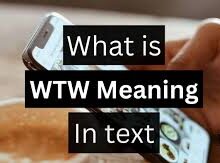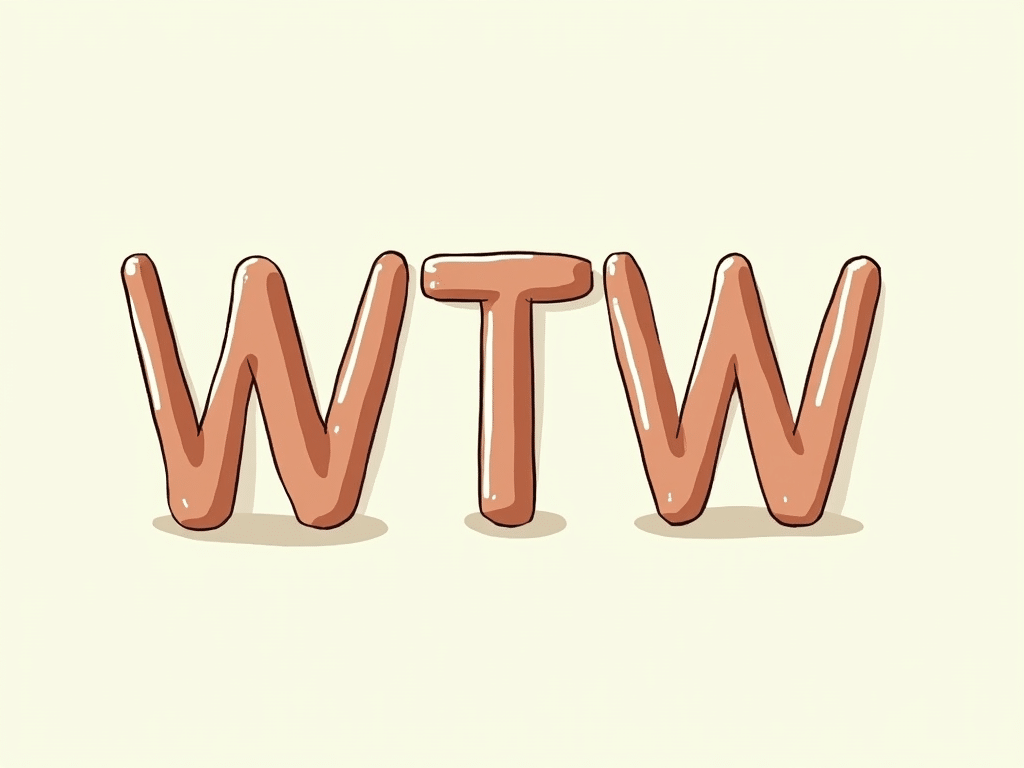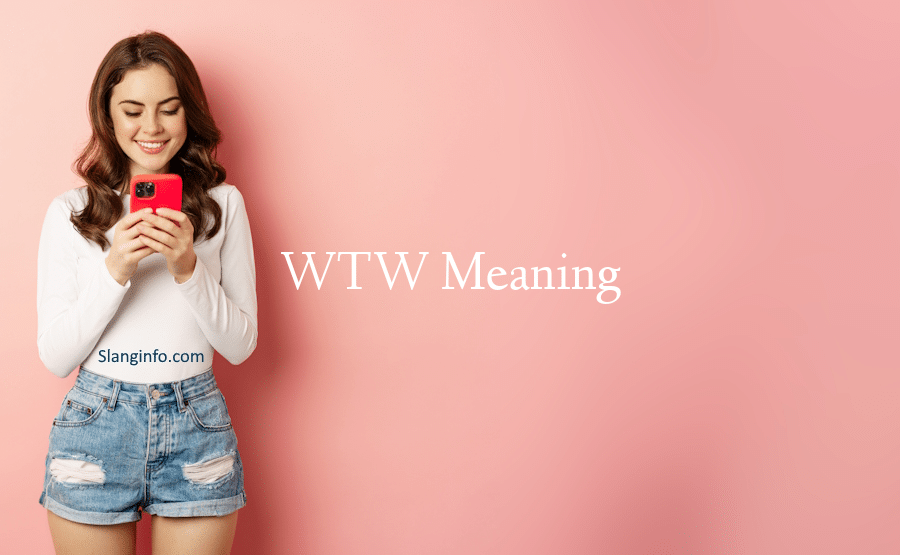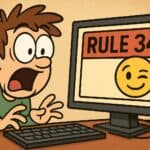In the world of texting and social media, acronyms and slang terms pop up faster than you can type. One acronym that’s gained popularity is WTW. But what does WTW mean? Let’s dive into the meanings and uses of this versatile acronym.
Primary Meanings of WTW
WTW has several meanings, depending on the context:
- What’s The Word?
- What The What
- What’s The Wave
Each of these meanings is used in different situations, but they all share a common thread of asking about what’s happening or what’s going on.

WTW in Texting and Messaging
In text messages and online chats, WTW is most commonly used as a casual greeting or conversation starter. It’s similar to asking “What’s up?” or “How’s it going?”
Examples of WTW in Conversations

Here are some ways you might see WTW used:
- “WTW bro, haven’t heard from you in a while!”
- “Just got home. WTW with you?”
- “WTW this weekend? Any plans?”
People often use WTW when they want to check in with friends or start a conversation without being too formal.
Variations of WTW
You might see WTW written in different ways:
- wtw (lowercase)
- WTW (uppercase)
- w.t.w (with periods)
All these variations mean the same thing, and the choice often depends on personal preference or the platform being used.
WTW on Social Media Platforms

WTW has found its way onto various social media platforms, each with its own slight twist on usage.
Instagram and Twitter
On these platforms, WTW is often used in captions or tweets to ask followers what they’re up to or to start a conversation. For example:
- “Beautiful day outside! WTW everyone?”
- “Friday night vibes 🎉 WTW for the weekend?”
TikTok
On TikTok, WTW might be used in video captions or comments to ask about trends or what’s popular. For instance:
- “WTW with this new dance challenge?”
- “Trying out this recipe, WTW if you’ve made it too!”
The meaning of WTW can vary slightly depending on the platform, but it generally maintains its core idea of inquiring about what’s happening or what’s trending.
Origin and Evolution of WTW
The phrase “What’s the word?” has been around for decades as a casual way to ask for news or information. As texting became popular, this phrase was shortened to WTW for convenience.
Over time, WTW has evolved to include other meanings like “What The What” (an expression of surprise or confusion) and “What’s The Wave” (asking about current trends or plans).
How to Use WTW Correctly
Using WTW correctly depends on the situation and who you’re talking to. Here are some tips:
- Use WTW casually with friends or peers
- Avoid using it in formal or professional settings
- Consider the age of the person you’re talking to – older adults might not be familiar with this slang
Potential Misunderstandings
Sometimes, WTW can be misunderstood. For example, someone might think you’re asking for a specific piece of information when you’re just trying to start a general conversation. To avoid confusion, you can follow up with more specific questions if needed.
Responding to WTW
When someone sends you “WTW,” they’re usually looking to start a conversation. Here are some ways to respond:
- Share what you’re currently doing: “Just finished work, thinking about grabbing dinner. You?”
- Ask about their plans: “Not much here. What about you? Any plans for tonight?”
- Share something interesting: “Just heard about a new movie coming out. Wanna check it out this weekend?”
The key is to keep the conversation going by sharing information or asking questions back.
WTW in Different Age Groups
WTW is more common among younger generations, especially teenagers and young adults. Here’s how different age groups might use it:
Teenagers and Young Adults
- Use WTW frequently in texts and social media
- Might use it multiple times a day to check in with friends
Adults
- May use WTW occasionally, especially if they interact with younger people
- Might prefer other greetings like “What’s up?” or “How’s it going?”
Older Adults
- Less likely to use or understand WTW
- Might need explanation if they encounter it
Understanding these differences can help you communicate more effectively across age groups.
Similar Slang Terms and Acronyms
WTW is part of a larger family of internet slang terms used for greetings and checking in. Here’s how it compares to some similar terms:
| Term | Meaning | Usage |
|---|---|---|
| WTW | What’s The Word? | General greeting or inquiry |
| WYD | What You Doing? | Asking about current activities |
| HMU | Hit Me Up | Invitation to contact or make plans |
| SUP | What’s Up? | Casual greeting |
Each of these terms has its own nuances, but they all serve to start conversations or check in with friends.
WTW in Popular Culture
While WTW isn’t as prominent in popular culture as some other slang terms, it does appear in various contexts:
- Song lyrics, especially in hip-hop and rap music
- Social media challenges or trends (e.g., “WTW Challenge” on TikTok)
- Memes and internet jokes
Its usage in these areas helps spread the term and keep it relevant in online communication.
The Impact of WTW on Language
Acronyms like WTW are part of a larger trend in language evolution driven by internet communication. Here’s how WTW and similar terms affect language:
- They speed up communication in text-based conversations
- They create a sense of in-group identity among users
- They challenge traditional grammar and spelling rules
- They can lead to misunderstandings between different age groups or cultures
While some view these changes as language degradation, others see them as natural evolution in the digital age.
Conclusion
WTW is a versatile acronym that’s become a staple in online communication, especially among younger users. Its primary meanings – “What’s The Word?”, “What The What”, and “What’s The Wave” – all serve to initiate conversations or express curiosity about current happenings.
Understanding WTW and similar internet slang can help you communicate more effectively in digital spaces. However, it’s important to use these terms appropriately based on your audience and context.
For more insights into popular online slang and acronyms, check out our articles on OMM meaning, IKYFL meaning, and ND meaning.
FAQs About WTW
Q: Is it rude to use WTW in a professional email?
A: Yes, WTW is considered informal and is not appropriate for professional communication.
Q: Can WTW mean different things in different contexts?
A: Yes, while it generally asks “what’s happening,” the specific meaning can vary based on the situation and the people involved.
Q: How do I know if someone is using WTW as “What’s The Word” or “What The What”?
A: Context is key. “What’s The Word” is more common as a greeting, while “What The What” is usually an expression of surprise.
Q: Is WTW used in spoken conversation?
A: While it’s primarily used in written communication, some people do use it in spoken language, especially among younger generations.
By staying informed about terms like WTW, you can navigate online conversations more smoothly and connect better with others in digital spaces. Remember, language is always evolving, and staying up-to-date with current slang can enhance your communication skills.







